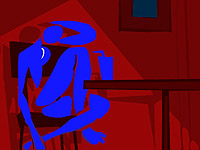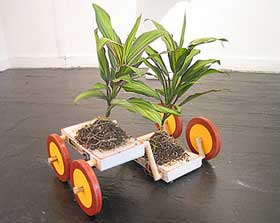Here's your favorite 13 lb rabbit/couch potato doing what she does best.

The Perfect Picture Photography School is world's leading provider of online photography, photoshop courses, and many more..






















 Sam Francis, “Untitled” (ca. 1988-89)
Sam Francis, “Untitled” (ca. 1988-89)(...)during the height of the Cold War in the 1950's, the CIA secretly promoted abstract expressionism as a means of discrediting the socialist realism of the Soviet Union.(...)The spy agency created and staffed an international institution they named the Congress for Cultural Freedom(CCF,) and from 1950 to 1967 (when the front group was at last exposed as a CIA operation,) the spook endowment had secretly bankrolled the abstract expressionist movement with untold millions of dollars. (...) The CIA orchestrated the publication of a major article on Jackson Pollock in LIFE Magazine declaring him "the shining new phenomenon of American art," and the "greatest living artist."(...) The CIA applied considerable muscle in its endeavor to support and advance the abstract expressionist movement, and in large part they were successful. Realism became passé as art critics focused on singing the praises of action painting.While this is certainly a very one-sided way of seeing things, the very fact that the CIA took such an active part in the art world is spooky. It's a classic conspiracy theory gone alternative, cynical and bewildering, as all good conspiracy theories are. Where does that put us? In the box of silly lunatics, children that are easily manipulated by anyone with money to spend on PR?




Photosynthesis Robot, by Amy Franceschini and Michael Swaine of Futurefarmers, is a possible perpetual motion machine driven by phototropism - the movement of plants towards the direction of the sun. The motion of the plants upon this four wheeled vehicle would propel slowly over a period of time.

I've been working with a group of artists on an idea not too distant from this, with one great difference: our project is not conceptual (sorry, can't reveal details for now). If it comes to life, it will be a highly complicated and high-tech work, nothing even similar to what I've been doing so far. And it costs. A lot. We're now fighting for funding. The question is: is it really worth creating "real things", if a "dummy" does the job? I mean, isn't that just the cutest thing in the world? Do we need to need more? Or maybe "doing the job" is actually hiding the possible diversity of such "jobs"... I just wish we came up with this simple witty idea instead of moving into heavy artillery.
Thanks Ivan Franco at YDreams for the link, and to we-make-money-not-art for the discovery.









In my area of the arts and humanities, the most dangerous idea (and the one under who's influence I have operated throughout my artistic life) is the complete relativity of all positions and styles of procedure. The notion that there are no "absolutes" in art — and in the modern era, each valuable effort has been, in one way or another, the highlighting and glorification of elements previous [I think it should be "previously" - Vvoi] "off limits" and rejected by the previous "classical" style.This rhetoric is so old I think it isn't really worth spending too much time on its critique (I've been writing about the issues and problems of the avant garde quite often anyway). Suffice it to say we all know there are no "absolutes", until we build them. And Foreman's theater has built such an absolute out of a particular stage language, a very consistent and not at all "off limits" one, at least not if by the term one means something innovative.
The exact effect of art can't be controlled or fully anticipatedThis is indeed interesting, and every artist must have had this experience - the work lives its own life. It isn't quite what I would call a revolutionary insight, but it is probably something new to many amateurs (and amateur amateurs) of art.
Great art makes itself vulnerable to interpretation, which is one reason that it keeps being stimulating and fascinating for generations. The problem inherent in this is that art could inspire malevolent behavior, as per the notion popularly expressed by A Clockwork Orange. When I was young, aspiring to be a conceptual artist, it disturbed me greatly that I couldn't control the interpretation of my work. When I began painting, it was even worse; even I wasn't completely sure of what my art meant. That seemed dangerous for me, personally, at that time. I gradually came not only to respect the complexity and inscrutability of painting and art, but to see how it empowers the object. I believe that works of art are animated by their creators, and remain able to generate thoughts, feelings, responses. However, the fact is that the exact effect of art can't be controlled or fully anticipated.
(...) Vermeer puts me into what had been [his subject's] condition of uncertainty. All I can do is wonder and wait. This makes me think about how not knowing is so important. Not knowing makes the world large and uncertain and our survival tenuous. It is a mystery why humans roam and still more a mystery why we still need to feel so connected to the place we have left. The not knowing causes such profound anxiety it, in turn, spawns creativity. The impetus for this creativity is empowerment. Our gadgets, gizmoes, networks of transportation and communication, have all been developed either to explore, utilize or master the unknown territory.What should I make of this? If you happen to have no background in philosophy, you might be impressed. The problem is, right next to this answer are more than a hundred answers that prove it wrong. They are ideas and reflections that put us back into a state of uncertainty, which, it is true, "spawns creativity", demanding new answers, new questions, new ways of touching.
If the unknown becomes known, and is not replaced with a new unknown, if the farther we reach outward is connected only to how fast we can bring it home, if the time between not knowing and knowing becomes too small, creativity will be daunted. And so I worry, if we bring the universe more completely, more effortlessly, into our homes will there be less reason to leave them?


 Botanica Beluosa - Monstrous Botany - soft sculpture ("Fabric Sculpture Installation ") by Martha Sue Harris
Botanica Beluosa - Monstrous Botany - soft sculpture ("Fabric Sculpture Installation ") by Martha Sue Harris